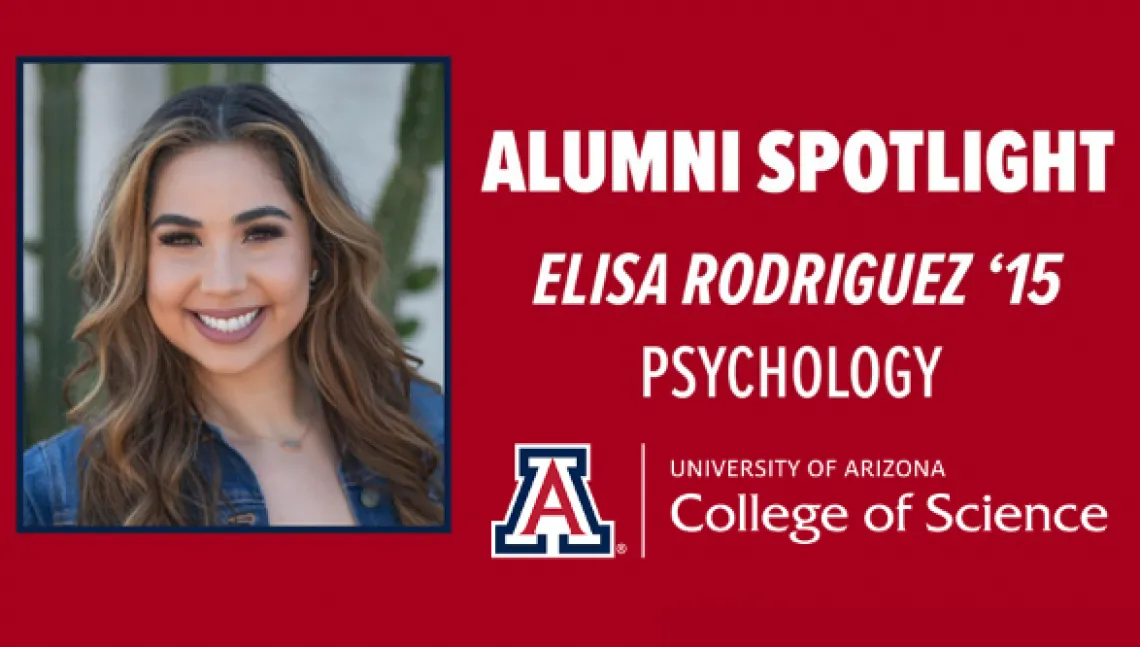Alumni Spotlight: Elisa Rodriguez

Elisa Rodriguez, a Tucson native and University of Arizona graduate, studied Psychology as an undergrad in the College of Science before obtaining a Masters of Science in Professional Counseling. Rodriguez, who currently works as a trauma therapist predominantly with children, laid the foundation to becoming a therapist during her time in the College of Science and the Department of Psychology.
Rodriguez spoke with the College of Science to reflect on her time as an undergraduate and how it prepared her for a career in professional therapy.
Elisa Rodriguez
Current job title/position: Professional Counselor
Hometown: Tucson, AZ
Current town: Chandler, AZ
Degree(s) from UA: Bachelor of Science in Psychology
Degree(s) from other institutions: Master of Science in Professional Counseling
College of Science: How did your time at University of Arizona and College of Science prepare you for post-graduate life and your career today?
Rodriguez: My time at the U of A really laid the foundation that allowed me to be successful in grad school. I was one of the only students that had a background in psychology as well as a background in research. I continuously return to these foundational topics daily with my clients when engaging in psychoeducation on the brain and behavior, specifically the way that trauma effects the brain.
CoS: What drew you to the Psychology department when you were deciding on your major as a student?
Rodriguez: I initially started out in the College of Medicine and during the Neurology unit I found that I wanted to dive more into this and explore all of the aspects of the brain and the way that it impacts who we are and why we do what we do.
CoS: When you look back on your time as a Wildcat, what memories stand out? Any favorite classes, labs, mentors, or research projects?
Rodriguez: I loved all of my classes in my field of study because I’m really passionate about people and I love learning about why we do what we do. While I was at the U of A I worked in the Cognition and Neuroimaging Laband I was able to participate in the different research projects that they were involved in at that time. I participated in brain imaging, neuropsych testing and every aspect of the research process and it was an invaluable experience. I learned so much during that time. I had some amazing mentors in the lab, Arianaand Kevin, who gave me all of the tools that I needed to be successful in grad school and in my future no matter what path I chose to take.
CoS: After graduating with a degree in Psychology and now in your career, what has surprised you most about how your education has impacted your professional success?
Rodriguez: I’m a trauma therapist so I work mostly with children and adolescents with trauma. My biggest take away from all of my classes and all of the neurological research would be that the brain is malleable. My clients are very young and many have been sex-trafficked, abused or fallen into addiction to cope with their experiences. They are hopeless that they can change the trauma-responses that have been hard-wired into their brains at such a young age. Giving these children the knowledge that they have the power to change their brain and rewire these pathways gives them a sense of control and empowerment and creates hope. So I didn’t expect that I would be able to give some of that education to others in such an impactful way.
CoS: What advice would you give to someone who is interested in pursuing an education or career in Psychology?
Rodriguez: I would say, find your why. Why do you do what you do? The field of psychology is all about people and whether you are working towards a career on the clinical side or the research side of psychology learning about people can be a daunting task. Finding your why and continuing to return to this when the research isn’t successful or when you’ve had an emotionally draining day with your clients is what will help you remain passionate, because this field is all about making a difference.

